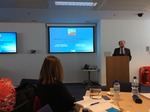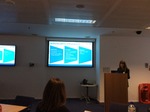Health literacy developments in Scotland
 Wednesday, March 18, 2015 at 7:41AM
Wednesday, March 18, 2015 at 7:41AM  Health literacy developments in Scotland
Health literacy developments in Scotland
Information literacy in the Health Sector was the theme of the fourth presentation at the Information Literacy Symposium in Glasgow last month.
Blythe Robertson, Policy Manager, Policy-centred & Self-Management, Scottish Government and Christine Hoy, Primary Care Develeopment Manager, Health & Social Care Alliance Scotland presented us with Health literacy developments in Scotland
It was good to hear about the planned developments. I have previously done some research into health literacy most notably for the chapter 'Information literacy in health management: supporting the public in their quest for health information'. The chapter was part of 'Information literacy and lifelong learning: policy issues, the workplace, health and public libraries' John Crawford and Christine Irving, 2013.
I could therefore relate to and endorse much of the speakers comments. However some of the facts certainly got my attention.
43% of English working age adults will struggle to understand instructions to calculate a childhood paracetamol dose.
This is a high percentage struggling with understanding, literacy and or numbers. In health matters, a wrong calculation can have serious affects. As Christine Hoy said, health literacy starts with the conversation and it is important to check understanding with health care.
Health literacy was defined as
Confidence, knowledge, understanding and skills to access and collaborate in our own healthcare and successfully self-manage.
As Blythe said we need to "widen people's eyes to health literacy needs" and there is a need to draw good health literacy practice together.
Next year will see a Health Literacy Action Plan for Scotland. Its aims are to:
- Raise awareness and the capabilities of information professionals
- Promote the development and spread of exisitng and new health literacy tools, innovations and technologies
- Improve access to these tools and resources
- Cater for health literacy needs at transitions of care.
Whilst transition has been a key focus for some information literacy and educational professionals it is good to see it as part of health literacy. Having personal experience of the need for health literacy at transitions of care i.e. elderly relatives being discharged from hospital to a care package, I know how much it is needed. I could also relate to Christine Hoy's comments re the need for community resources to be connected and people being a source of information for most people. I was certainly grateful to health professionals in the hospital signposting and referring me to community resources including colleagues working in the community.
Support for health issues can come in all different shapes and sizes from practical to social activities. As Christine said "health professionals used to sign post to kitemarked resources not walking groups".
In her presentation Christine highlighted useful sources of information including ALISS A local Information System for Scotland www.aliss.org I've heard about ALISS before it is a great resource. If you are not familiar with it then please have a look. It "helps signpost people to useful community support" for "health and wellbeing resources". It is a collaborative tool in that the community can contribute to the resources.
Again librarians were highlighted as 'key community resources'.
The presentation covered other issues including disability and the Social Disability Model. The slide with a person in a wheelchair at the bottom of a set of stairs with the caption
We wouldn't be disabled but for the systematic barriers that society places in our way.
caught my attention and made me think of how may systematic barriers society places in our way.
The presentation slides are available on slideshare so please have a look at the Health literacy developments in Scotland

